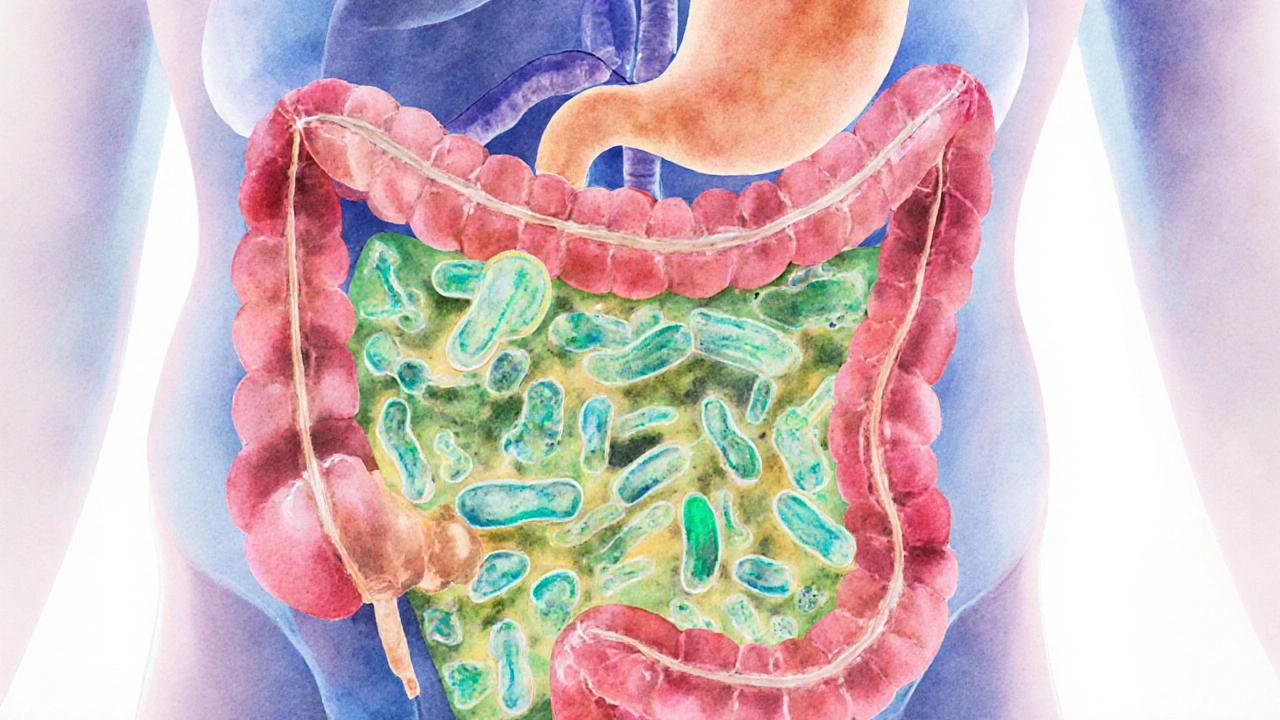Probiotics for GERD Effectiveness Estimator
This tool estimates the potential effectiveness of probiotics for GERD symptoms based on selected strain and daily dose.
Key Takeaways
- Probiotics can modestly improve GERD symptoms by balancing the gut microbiome.
- Evidence is strongest for Lactobacillus rhamnosus GG and Bifidobacterium lactis.
- Typical effective doses range from 5‑10billion CFU per day for 8‑12 weeks.
- Probiotics work best alongside diet changes, weight management, and proper medication use.
- Most healthy adults tolerate probiotics well; caution is advised for immunocompromised individuals.
When it comes to gut health, Probiotics are live microorganisms that, when taken in adequate amounts, confer a health benefit to the host. Many people wonder if probiotics can really calm down acid reflux, a question that has sparked a flood of studies and consumer interest.
Gastroesophageal reflux disease (GERD) is a chronic condition where stomach acid repeatedly flows back into the esophagus, causing heartburn, regurgitation, and sometimes damage to the lining. While prescription meds such as PPIs target acid production, they don’t fix the underlying microbial imbalance that can aggravate reflux.
What Exactly Are Probiotics?
Probiotics belong to the broader gut microbiome, a community of trillions of bacteria, fungi, and viruses that live in the digestive tract. The most common probiotic genera are Lactobacillus and Bifidobacterium. These microbes help digest food, produce short‑chain fatty acids, and keep harmful bacteria in check.
How GERD Happens - A Quick Anatomy Lesson
The lower esophageal sphincter (LES) acts like a valve between the stomach and the esophagus. In GERD, the LES relaxes inappropriately, allowing acid reflux to splash upward.
Factors that weaken the LES include obesity, smoking, certain medications, and a dysregulated gut microbiome. When harmful bacteria overgrow, they can increase intra‑abdominal pressure or produce gases that push stomach contents up.
Mechanisms: Why Probiotics Might Help GERD
- Restoring microbial balance: By crowding out pathogenic strains, probiotics reduce gas production that can elevate pressure on the LES.
- Improving gastric emptying: Some strains accelerate stomach emptying, leaving less time for acid to pool.
- Modulating inflammation: Probiotics produce butyrate and other metabolites that calm esophageal inflammation caused by acid exposure.
- Enhancing mucosal defenses: Certain bacteria stimulate mucus secretion, creating a protective layer on the esophageal lining.

What the Research Says
Clinical trials are still small, but a handful stand out:
| Strain | Daily Dose (CFU) | Study Length | Result |
|---|---|---|---|
| Lactobacillus rhamnosus GG | 10billion | 12weeks | Significant reduction in heartburn frequency (p<0.01) |
| Bifidobacterium lactis BB‑12 | 8billion | 8weeks | Improved esophageal pH scores, modest symptom relief |
| Lactobacillus plantarum 299v | 5billion | 6weeks | No statistically significant change vs. placebo |
A 2023 meta‑analysis of eight randomized trials (total N≈620) concluded that multi‑strain probiotics reduced GERD symptom scores by an average of 1.3 points on a 0‑5 scale, compared with placebo. The benefit was most pronounced in patients who were not on daily proton‑pump inhibitors.
Practical Recommendations
- Pick the right strains: Look for products that list Lactobacillus rhamnosus GG, Bifidobacterium lactis BB‑12, or a clinically studied multi‑strain blend.
- Mind the dose: Aim for at least 5billion colony‑forming units (CFU) per day; higher doses (10billion) have shown clearer effects.
- Timing matters: Take probiotics on an empty stomach (30minutes before a meal) to improve survival through gastric acid.
- Combine with diet tweaks: Reduce caffeine, chocolate, high‑fat meals, and avoid lying down after eating.
- Trial period: Give the supplement 8‑12 weeks before judging effectiveness; many studies used this window.
Potential Risks and Who Should Skip Them
Probiotics are generally safe for healthy adults, but there are exceptions:
- Immunocompromised patients: Rare cases of bloodstream infection have been reported.
- Those with severe pancreatic disease: Certain strains can cause gas buildup.
- Pregnant or breastfeeding women: Most research suggests safety, but it’s wise to consult a physician.
Side effects are usually mild-bloating or mild gas during the first few days-as the gut adjusts.
Bottom Line: Are Probiotics Worth Trying for GERD?
If you’re already on a PPI and still experience nightly heartburn, adding a proven probiotic blend can be a low‑risk, potentially helpful adjunct. The key is choosing the right strain, dosing correctly, and giving it time to work.
Frequently Asked Questions
Can any probiotic help my reflux?
Only strains that have been studied for GERD-like Lactobacillus rhamnosus GG and Bifidobacterium lactis-show consistent benefits. Generic blends may still help gut health but lack solid evidence for reflux relief.
How long before I notice an improvement?
Most trials reported noticeable symptom reduction after 4‑6 weeks, with optimal results at 8‑12 weeks.
Should I stop my prescription medication?
Never stop a prescribed PPI or H2 blocker without talking to your doctor. Probiotics are meant to complement, not replace, medication.
Are fermented foods enough, or do I need a supplement?
Fermented foods like yogurt, kefir, and sauerkraut provide beneficial bacteria, but the strains and CFU counts are variable. A standardized supplement guarantees the dose studied in research.
What side effects should I watch for?
Mild bloating, gas, or a temporary increase in stool frequency are common. Severe reactions are rare but should prompt a medical call.


Abhishek A Mishra
I tried the Lactobacillus rhamnosus GG supplement after reading about it, and honestly it's kinda helped my heartburn.
I started with 10 billion CFU daily for a month, and the burning episodes have lessened.
It wasn't a miracle cure, but the mild reduction is noticeable.
Also, I kept my diet low‑fat and it seemed to make a difference.